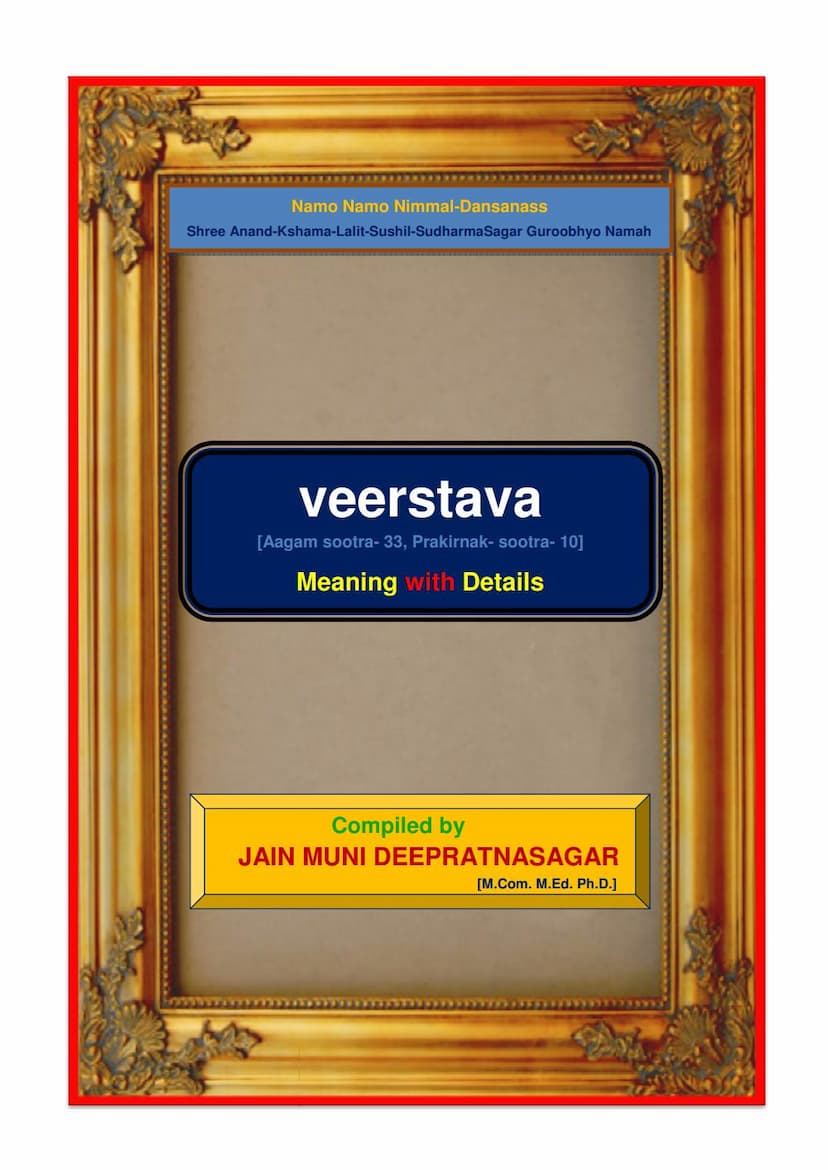Agam 33 Prakirnak 10 Veerstava Sutra English Translation
Added to library: September 1, 2025

Summary
Here's a comprehensive summary of the Jain text "Agam 33 Prakirnak 10 Veerstava Sutra" in English, based on the provided pages:
Overview:
"Veerstava" is the tenth Prakirnak Sutra within the Jain Agamas, cataloged as Agam 33. Compiled by Muni Deepratnasagar, this text is essentially a glorification of Lord Mahaveer, the 24th Tirthankara, through a recitation of his 26 key epithets or names. The publication aims to make Jain Agamic literature accessible in English for a wider audience, particularly for the new generation and those abroad.
Purpose and Scope:
The primary purpose of "Veerstava" is to praise and extol the virtues of Lord Mahaveer. It lists and explains 26 significant names that describe his divine qualities, achievements, and role as a spiritual leader. The text provides brief commentaries on each name, explaining its significance in the context of Jain philosophy.
Content Breakdown:
The text is structured into the following sections:
- Introduction: This section briefly introduces the "Veerstava" Sutra, its context within the Jain Agamas, and the aim of the publication to provide an English translation.
- 26 Names of Veer-Jinendra: This is the core of the text, listing and elaborating on the 26 names attributed to Lord Mahaveer. These names highlight his omnipotence, omniscience, compassion, fearlessness, and role as a spiritual guide.
- Detailed Explanation of Names: The subsequent pages offer a more in-depth meaning and commentary for each of the 26 names. These explanations connect the names to specific Jain doctrines and Mahaveer's life and teachings.
- Conclusion: The text concludes with a prayer from the compiler to Lord Mahaveer, seeking spiritual liberation due to his immense compassion.
Key Themes and Concepts:
- Glorification of Lord Mahaveer: The entire text is dedicated to praising Mahaveer's attributes.
- Jain Cosmology and Philosophy: The names and their explanations reflect fundamental Jain concepts such as karma, liberation (moksha), omniscience (keval gyana), detachment (veetaraag), and the cycle of birth and death.
- The Nature of an Arihant/Jina: The epithets describe the qualities of an Arihant, one who has destroyed karmic enemies and attained spiritual perfection, and a Jina, one who has conquered internal foes.
- The Role of a Tirthankara: The text emphasizes Mahaveer's role as a Tirthankara, who establishes the four-fold religious order (Chaturvidha Dharma Sangh).
- Accessibility of Jain Literature: The publication's goal is to make ancient Jain scriptures accessible to a modern, global audience through English translation.
The 26 Names and Their Meanings (as elaborated in the text):
The text systematically breaks down the 26 names and their meanings. Here's a summary of some key ones:
- Aruha: Free from rebirth, having burned the seeds of existence through meditation.
- Arihant: Destroyer of karmic spiritual foes, worthy of worship and spiritual perfection.
- Arahant: Free from attachment and possessions, omniscient, venerable.
- Dev: Divine being, playing with the "lady-liberty" (Siddhi-vadhu), having gained eternal bliss.
- Jina: Spiritual conqueror, having expelled mundane attachment through renunciation and equanimity.
- Veer: Brave, having pierced the knots of karma, remaining aloof from worldly pleasures.
- Param Karunik: Extremely compassionate, with a heart full of compassion for all creatures.
- Sarvajna: Omniscient, knowing all modes of matter past, present, and future.
- Sarvdarsi: All-seeing, visualizing the general forms of all substances.
- Paaragaamee: Transcended the cycle of births and deaths, realized the ocean of knowledge.
- Trikaalvid: Knower of the past, present, and future.
- Naath: Protector, guiding and saving worldly creatures.
- Veetaraag: Attachment-transcended, free from attraction and aversion.
- Kevali: Endowed with purity of knowledge (omniscience).
- Tribhuvan Guru: Universal teacher, infusing beneficial law into teachings.
- Poorna: Complete.
- Tribhuvan varistha: Universally supreme in power, knowledge, and designation.
- Bhayaant: Fearless, having conquered seven types of fears.
- Teerthankar: Prophet and establisher of the four-fold religious order.
- Shakraabhivandit: Bowed to by celestial kings.
- Jinendra: Master conqueror, king of Jinas.
- Vardhamaan: Enhancer of weal, causing increase and prosperity.
- Hari: Guardian, associated with Vishnu due to divine signs and charity.
- Hara: Remover of misery and karmic dust.
- Kamalaasana: Lotus-seated, associated with Brahma, appearing to face four directions with four religious practices.
- Buddha: Enlightened, knowing all general and particular modes of matter.
Publication Information:
- Publisher: Deepratnasagar
- Compiler: Muni Deepratnasagar (also referred to as Deepratnasagar)
- Translation Source: Based on translation by Colonel D.S. Baya, edited in Hindi by Dr. Subhash Kothari.
- Format: Published as a "Net-Publication," with plans for a book format and availability in Microsoft Word for user editing.
- Publication Date: 01/11/2013
In essence, "Veerstava" is a devotional text that offers a detailed linguistic and philosophical exploration of the glorious attributes of Lord Mahaveer, making these profound spiritual concepts accessible to a wider English-speaking audience.